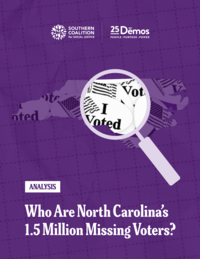Introduction
Recent elections in North Carolina have been marred by false allegations of voter fraud based on the claim that the state’s voter rolls are bloated with “ineligible” voters. These loud and relentless accusations are usually based upon erroneous data analysis and lack any real evidence of widespread unlawful voting. They have nonetheless captured the imagination of legislators across the country who are erecting additional barriers to the ballot box for people who want to exercise their fundamental right to vote.
The real threat to our democracy is just the opposite: too many people don’t register to vote and don’t show up at the polls. As a result, public officials are chosen by a fraction of the electorate and legislative bodies are not truly representative of the people. Even in record years of voter turnout, the United States lags significantly behind global peers. Nearly 1.5 million North Carolinians are considered “missing voters” — U.S. citizens aged 18 or older who are eligible to vote but are not registered, or who are registered, but are in “inactive” status because they’ve gone two federal election cycles or more without casting a ballot. The number of missing voters is more than the combined population of the state’s largest cities, Charlotte and Raleigh. This is perhaps unsurprising given North Carolina’s democratic ecosystem, which is rife with obstacles to civic engagement. According to Dēmos’s Power Scorecard, North Carolina ranks 38th in terms of democratic vitality. This means North Carolina is in the bottom quarter of states based on how easily people can engage in the political process to determine who represents them and how they are served. It ranks 39th in terms of representative elections, or how people experience and participate in inclusive electoral processes. These rankings confirm the need to improve systems that facilitate political participation in the state.
Even more concerning, a close look at North Carolina’s data tells us that the status quo is leaving behind voters from our most vulnerable and historically marginalized communities, namely Black and brown voters, voters with disabilities, and our youngest voters.
In this report, Southern Coalition for Social Justice and Dēmos set the record straight regarding North Carolina’s voter rolls. Using reliable methodology and accurate data, we find North Carolina has nearly 1.5 million missing voters. We also examine barriers to voting in North Carolina to identify commonsense policy changes that can expand voter participation and move us closer to an inclusive and multiracial democracy.
Read the full report on North Carolina's 1.5 million missing voters
